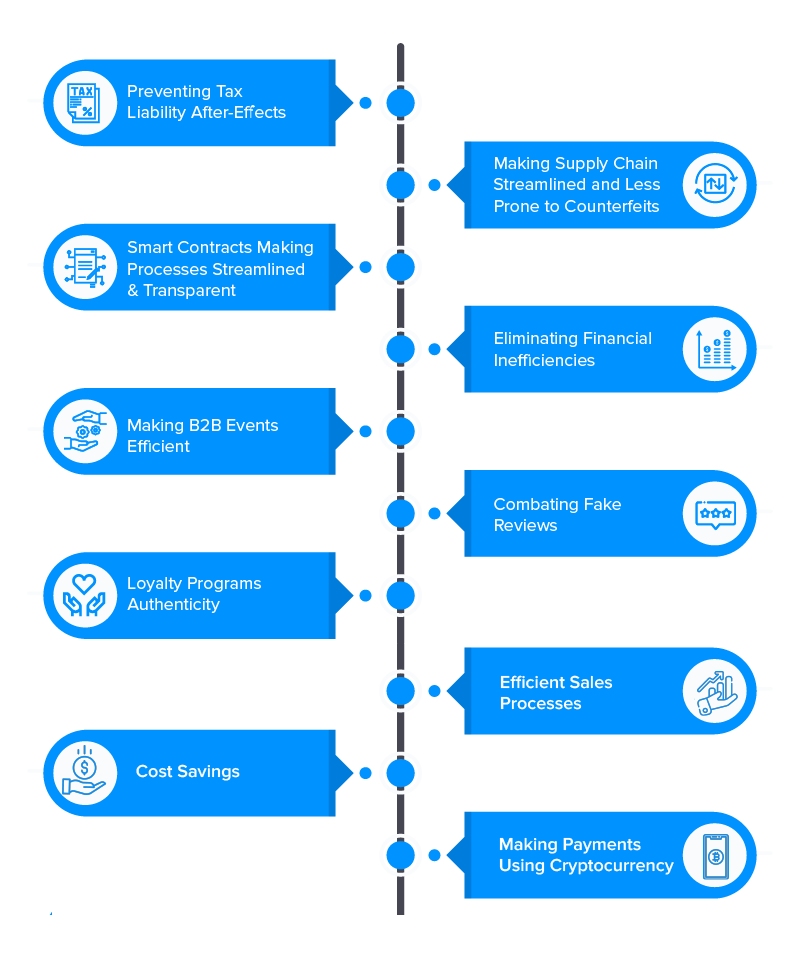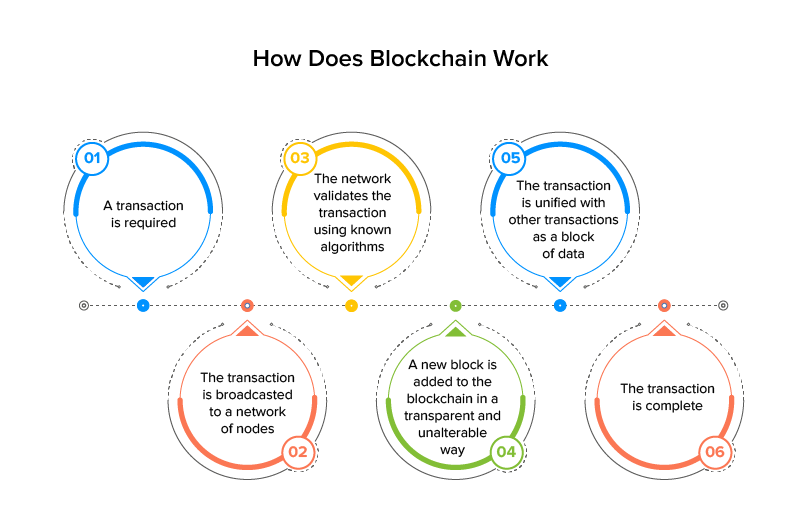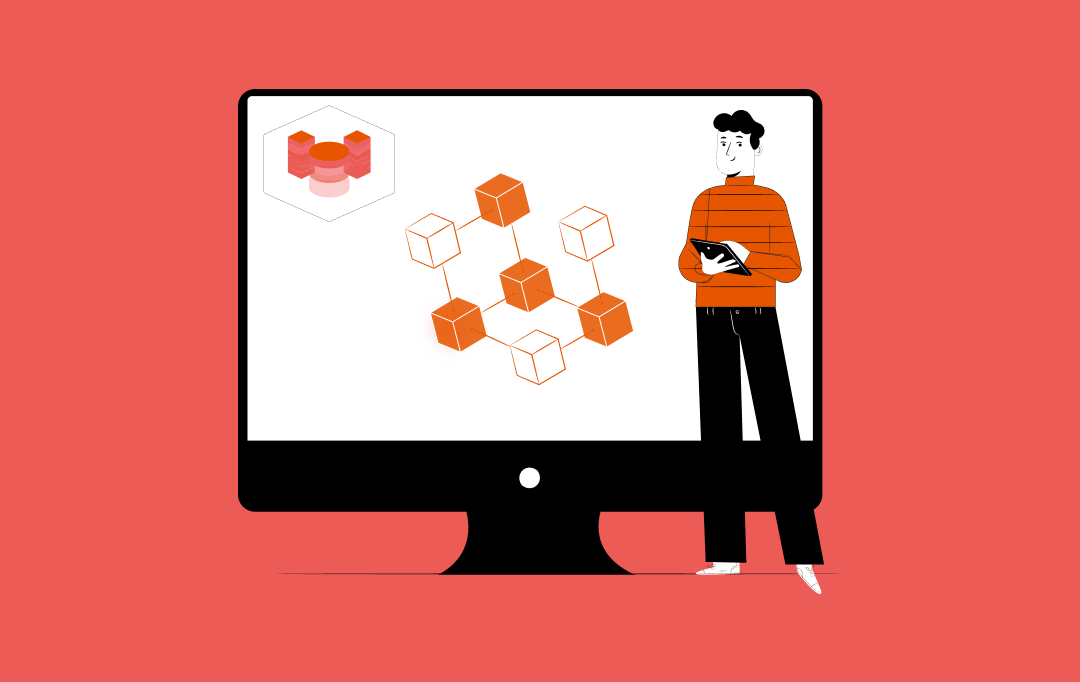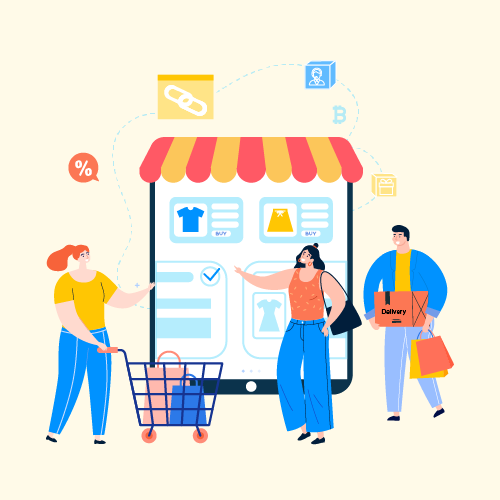- The Prevalent B2B eCommerce Challenges
- Lesser Operational Efficiency
- Non-Transparency in Payments
- Non-Dependable Data Security
- Overproduction of Material
- Inefficient Omni-Channel Practice
- How Blockchain Makes B2B eCommerce Better & Profitable
- 1. Preventing Tax Liability After-Effects
- 2. Making Supply Chain Streamlined and Less Prone to Counterfeits
- 3. Smart Contracts Making Processes Streamlined & Transparent
- 4. Eliminating Financial Inefficiencies
- 5. Making B2B Events Efficient
- 6. Combating Fake Reviews
- 7. Loyalty Programs Authenticity
- 8. Efficient Sales Processes
- 9. Cost Savings
- 10. Making Payments Using Cryptocurrency
- Blockchain Use Cases in eCommerce and Retail
- 1. AORA
- 2. Rate
- 3. Retail.Global
- 4. Crowdz
- How We Aid You in Becoming a Blockchain eCommerce Marketplace
- FAQs around How Blockchain is Used in Retail and eCommerce Industries
The eCommerce sector has crossed several leaps and bounds to be where it stands today on the technical and innovation grounds.
Right from the adoption of omni-channel retail to the inclusion of AR/VR and IoT technologies bettering its customers’ experience, the domain has grown manifold in giving users more than what they expected from a retail sector several years back.
But even amidst these innovations and disruptions, there were some inherent challenges that remained. Challenges like data security, frictionless payments, etc. These demands were apt for the adoption of Blockchain technology in retail and ecommerce industries.
In this article, we are going to look into how Blockchain for the retail industry is not just the need of the hour, but also the road to making the B2B retail domain profitable.
Table Of Contents
The Prevalent B2B eCommerce Challenges
How Blockchain Makes B2B eCommerce Better & Profitable
Blockchain-focused Startups which are Redefining B2B eCommerce
How We Aid You in Becoming a Blockchain eCommerce Marketplace
FAQs around How Blockchain is Used in Retail and eCommerce Industries
The Prevalent B2B eCommerce Challenges
Lesser Operational Efficiency
There are multiple discrepancies when it comes to handling the business operations in an eCommerce market where the products are received from multiple locations. Streamlining multiple stakeholders like logistics and payment partners is not an easy task. Another problem comes when integration has to be established with different management systems and the overall workflows in the supply chain cycle.
Non-Transparency in Payments
When it comes to B2B ecommerce, specially at the global level, there is a lot of gray area that a service provider and their customers encounter. One of the most common ones is the handling charges and miscellaneous fees like authorization. These overhead costs are generally clubbed into one and not explained by the retailers.
Non-Dependable Data Security
There are several instances where the consumer data has been brought under scrutiny because of ill-structured data storage practices. Irrespective of whether the information is saved on the cloud or locally, there is always a chance of it getting mistreated by hackers.
Overproduction of Material
The sustainability issues that grow out of overproduction of material, have been crippling the eCommerce industry for a very long time. Businesses, more often not, miscalculate the amount of material that is actually demanded by their users and end up developing more than what is required in the market. And generally, this excess ends up being discarded in a way that hurts the environment.
Inefficient Omni-Channel Practice
While the benefits of omni-channel retail are wide-spread, when you put the system in practical use, you can find several loopholes in the ecosystem. In the actual picture, customers and retailers seldom have real-time access to the product’s serial number, the status of product details like the payment status, order processing status, real-time order geo-location, and the delivery status.
Every single one of these eCommerce issues can be solved by Blockchain and retail together; let us look into how the amalgamation of Blockchain eCommerce works in the real world.
How Blockchain Makes B2B eCommerce Better & Profitable
Blockchain applications in the retail industry go beyond making payments frictionless and transparent. Here are some benefits of using Blockchain in retail business.

1. Preventing Tax Liability After-Effects
The US Supreme Court in 2018 cited figures which mentioned the lack of online sales tax was costing them more than $44 billion yearly. Following the statement, a number of states started imposing felony charges for not paying sales tax of more than $10,000.
Blockchain for B2B networks, in this respect, helps businesses transmit records of their sale to the tax authorities, saving them from any tax liabilities. The digital sales receipts, invoices, and other non-duplicable retail documents would lower the chances of fraud and allow the businesses a simple means for attaining tax refunds on their B2B retail purchases.
2. Making Supply Chain Streamlined and Less Prone to Counterfeits
The movement of information among third and fourth parties involved in a B2B eCommerce landscape can complicate transactions, which can lead to delayed supplier payments and disrupted reconciliation processes.
The benefits of Blockchain in retail can be seen in the fact that the immutable factor can result in fast, permissioned, and audited B2B interactions between the sellers, buyers, and the logistics providers. It can also augment established B2B integration technologies like XML, EDI, API-based B2B by making them visible to everyone for information flows and transactions.
Above all, the one thing that the amalgamation of Blockchain in Supply Chain retail gives birth to is product provenance check – a must-have for the B2B sector having multiple stakeholders. It becomes extremely easy for the stakeholders to check the origin of the product, thus crossing all the instances of getting their hands on a counterfeit product.
3. Smart Contracts Making Processes Streamlined & Transparent
The B2B eCommerce system majorly runs on RFPs. Through the help of smart contracts, the customers are able to lay out their project, along with all the necessary details like intricacies, payment plans, and delivery timeline. The retailers, then, bid to offer the different project elements with their individual offer.
The beauty of smart contracts is that the retailers and customers cannot back out from the decided terms and conditions of the agreement, otherwise they will not be able to get the stipulated amount.
4. Eliminating Financial Inefficiencies
According to an IDC report, the global spending on Blockchain solutions is projected to be nearly USD 19 billion in 2024, growing at a CAGR of 48% from 2020-24. Banking, followed by manufacturing, and retail are projected to be the largest industries for Blockchain spending.
In a B2B eCommerce setup, there are multiple benefits that the Blockchain and B2B payments mix comes with –
- Fraud prevention
- Expedited settlements
- Frictionless payments
5. Making B2B Events Efficient
Event planning and management is always deemed to be a difficult exercise for a B2B retail house. The companies need to take care of multiple things like booking, confirmation, validating tickets, identifying participants, etc.
The Blockchain eCommerce technology handles a number of these issues by a ticket scanning and attendance tracking system, which doesn’t just guarantee that duplicate tickets are not issued but also prevent reselling of void tickets.
6. Combating Fake Reviews
The UK’s Competition and Markets Authority (CMA) estimates that the fake reviews potentially influence £23bn of UK customers spending every year. Fake reviews don’t just have the potential to rip off a retail business from the profit it could draw, but also tarnish their reputation, often leading to their demise.
When you deploy Blockchain in the review mechanism, it stores data in blocks that can be added in a chain having similar information blocks. Every block has to be verified across multiple networks and only then it can be added to the chain, to then become immutable. The use of Blockchain in the retail industry can be seen in the creation of a digital map of people who visit your B2B eCommerce platform.

7. Loyalty Programs Authenticity
From collecting airport miles to grocery store points, reward and loyalty programs are how retailers engage with their customers in order to remain competitive in the marketplace. Scarily, the present programs are extremely prone to misuse and fraud, meaning retailers have to put in extra effort to ensure they are maintained correctly.
Blockchain and eCommerce addresses these issues through its new way of handling, securing, and decentralizing the loyalty program data. The technology aids in streamlining the development and transmission of the points across programs and retailers. Through the time-stamped, tamper-proof database, the retailers can securely track the loyalty programs transparently and easily.
8. Efficient Sales Processes
The B2B sales processes are based on relationships and responsibilities, wherein trust is essential to a B2B sales success. As per reports, most of the businesses, as large as 50%, either do not check the credit history of other businesses or go for insecure payment methods.
This is where the Blockchain technology presents an opportunity to expedite the creation of trusted relationships at reduced costs. By implementing Blockchain for B2B retail, it is possible to create a trusted and reliable system to strengthen relations, eventually leading to more leads and sales opportunities.
9. Cost Savings
Blockchain in retail businesses allow significant cost savings for the stakeholders. Firstly, Blockchain speeds up the entire transaction process, immediately moving the customer payment to the vendor. This faster process has a direct impact on the speed of the supply chain, which leads to quick delivery of products to the customers, thus enabling greater customer satisfaction. Secondly, by bypassing credit card processors and other merchant services, Blockchain reduces the final price of the products/services.
10. Making Payments Using Cryptocurrency
B2B retailers make use of multiple payment methods in their online business, however, they are still unable to ensure secure transactions. Moreover, the processing fee charged by the third party apps during transactions form an extra burden on the customers to pay more than the actual price for products/services.
With Blockchain and cryptocurrency in ecommerce, the online payments not only become more secure but easier. Plus, there is no necessity for customers to pay higher transaction fees.
Blockchain Use Cases in eCommerce and Retail
Blockchain technology is known for its security aiding facilities, but there are a number of technology empowered eCommerce startups which are taking Blockchain benefits beyond safeguarding your system data and customers’ credentials.
Blockchain development service companies across the globe are now exploring how decentralized technology can power international commerce, retailer reputation management, lower ubiquitous fees, and even reinvent the loyalty programs. Here are some startups defining Blockchain technology usage in retail and eCommerce industries.

1. AORA
It is a Blockchain powered global buying platform which looks into cross-border eCommerce and end-to-end crypto shopping. The platform enables users to buy items from several online marketplaces in China and the US, while using crypto as a tender.
AORA also works as an intermediary which purchases the items on the behalf of the users and handles logistics ensuring that the items are purchased and shipped in time.
2. Rate
The Singapore-housed fintech company is working on bettering how cross-border ecommerce is operated, through its Blockchain for B2B payments. They make use of Blockchain for deploying their in-browser and in-app payment system. Lazada and Amazon are two of its top merchants.
It also has a RateX desktop browser extension which keeps the shoppers updated about real-time exchange rates needed for making cross-border transactions.
3. Retail.Global
The Moscow based global eCommerce platform aims at uniting the companies and experts in a single platform where the different eCommerce facets can get consolidated. The idea behind the startup defining Blockchain technology usage in retail is to offer a software which would enhance sales and offer logistical solutions to several industry-wide issues.
4. Crowdz
It is a marketplace where the sellers, buyers, and investors can interact and sell their products, engage in transactions, and expedite cash flow. Through Crowdz, business operators and managers who are in urgent need of cash can see the bids made on their account receivable and decide on the terms which best suits them.
The end goal for the Blockchain for retail industry is to enable businesses who are seeking liquidity to buy inventory, pay the suppliers, etc.
How We Aid You in Becoming a Blockchain eCommerce Marketplace
There are primarily two ways Appinventiv uses Blockchain to empower B2B eCommerce platforms:
- As the primary marketplace technology
- Enhancing the traditional marketplace with Blockchain centric tools.
Irrespective of the ways, there are some Blockchain for B2B differentiators that we incorporate in all your B2B eCommerce projects:
Smart Contracts: If you remember our Smart Contracts guide, you’d remember how these are digitally-signed agreements that prevent fraud and eliminate third-party payment processing fees. We have helped several multi-vendor eCommerce platforms use smart contracts for tracking transactions, subscriptions, and agreements between the users.
![]()
Fees and Payment: We use the capabilities of blockchain technology to create decentralized marketplaces which offer payment through cryptocurrencies which can be exchanged for fiat currencies (depending on the client’s requirements).
The benefits of this system includes:
- Instant payments that does not require third-party financial services
- Non-requirement of credit card details or personal information.
Supply Chain Management system: We truly believe that Blockchain and supply chain are a match made in heaven. By incorporating the technology in the supply chain system, we bring several benefits in the picture:
- Real-time tracking of the order
- Better record management on a decentralized database
- Tracking item’s origin and genuinity.
In addition to the development of these Blockchain for retail deliverables, we also help our clients solve the technology’s biggest challenges, including –
Low throughput time – We use different techniques like batch processing, sharding – side chains to solve the issue of low processing time.
Difficulty in creating a refund system since Blockchain is inherently immutable – We create a system where you can initiate a new transaction for returning the money.
Difficulty in performing user history centric promotion, since the data is locked in the Blockchain system – In order to match functionalities of the platform, we can map which user details should be concealed and which can be made visible for the marketers to use in promotions.
FAQs around How Blockchain is Used in Retail and eCommerce Industries
Q. How is Blockchain used in retail or eCommerce?
A. The use cases for Blockchain in eCommerce ranges from eliminating counterfeiting of products and streamlining of supply chain to lowering fake reviews instances and secure payment mechanisms.
Q. How can Blockchain smart contracts be used in eCommerce?
A. In eCommerce, the Blockchain opportunities’ list generally has smart contracts as a recurring name. Here are some of the smart contracts specific capabilities of Blockchain technology: Ensuring that the deal is attended to according to its intricacies well within the stipulated time, backing the Blockchain-based payment systems in a way that it is only released when the contracts’ guidelines are met, etc.
Q. How would you use Blockchain in the eCommerce supply chain?
A. The first step to implementing a supply chain focused blockchain network is finding a use case of where it can be applied. Here are the different places we apply Blockchain in supply chain – real-time tracking of the order, better record management on a decentralized database, and tracking item’s origin and genuinity.
Q. How Blockchain technology can help B2B companies become more profitable?
A. B2B sales success and Blockchain technology work almost hand-in-hand. But you are more likely to see the profit in the face of lowered operational costs and customers’ LTV. By making your eCommerce offering more streamlined and transparent, Blockchain hits on multiple long term profit-generating nerves.
Q. How can Blockchain be used in supply chain management in the retail industry?
A. B2B retail supply chain involves a whole chain of transactions including securing raw material from supplier, movement of goods to the manufacturer, manufacturing of the product, supplying it to vendors, and delivering the products to purchasers. By leveraging Blockchain in the supply chain, the records of all such transactions can be permanently documented and stored securely.
Further, frequently arising issues in the form of time delays, sporadic movement of the product, etc. can also be easily tracked via Blockchain.
Q. How can Blockchain technology change how B2B relations are managed?
A. In a B2B business, trust is the most important factor. However, with the amount of fraud payments (roughly 75%, as per reports) that take place in B2B transactions, the level of mistrust among businesses is enormous.
The implementation of Blockchain technology in the retail industry allows for creation of a reliable and trusted system that strengthens B2B relations.



The Rise of Blockchain in Digital Marketing - Benefits, Use Cases and Challenges
Blockchain technology is revolutionizing digital marketing by transforming strategies through its decentralized and secure framework. It provides marketers with unparalleled transparency in campaign tracking and data management, guaranteeing increased security and privacy for users. As the digital landscape is advancing at a fast pace, blockchain in marketing offers the digital marketers with the means to…

Blockchain Interoperability: The Key to Connect Siloed Blockchain Networks
Blockchain has been a revolutionary response for industries facing the growing pressure of centralized operations’ limitations. By building an ecosystem which runs on zero trust, the technology introduced the world with processes that were incredibly neutral, change-proof, and 100% transparent when compared to their predecessors - traditional computing environment. Having reached a stage where blockchain…









